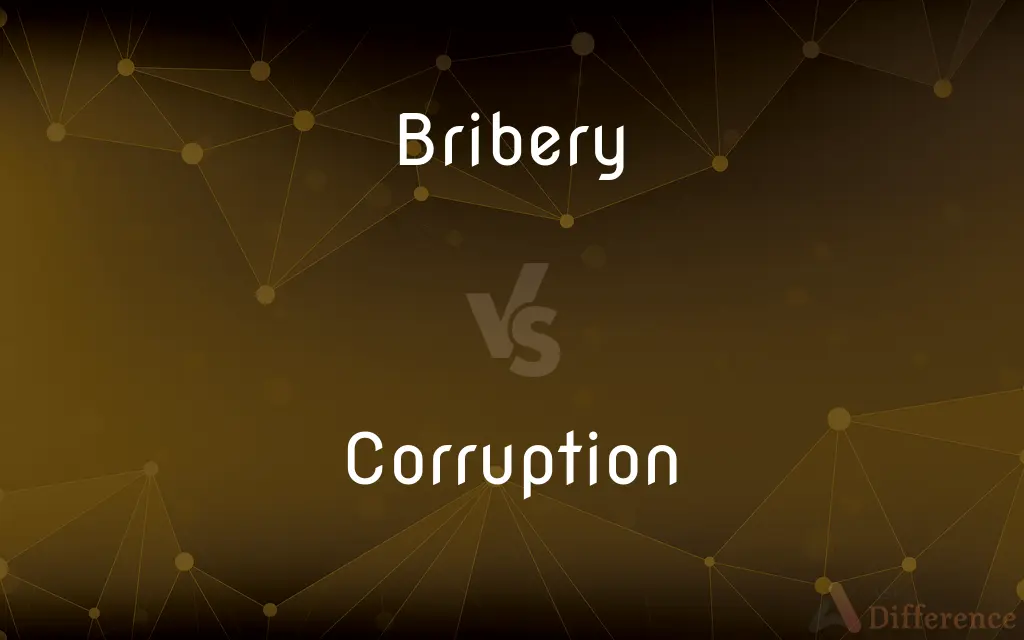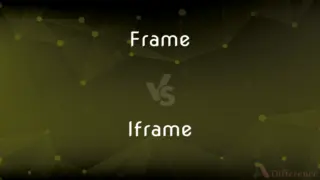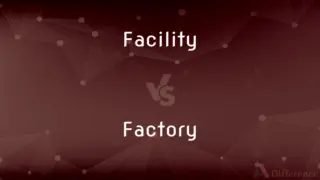Bribery vs. Corruption — What's the Difference?
Edited by Tayyaba Rehman — By Fiza Rafique — Updated on October 13, 2023
Bribery involves giving or receiving something of value to influence action, while corruption is a broader term, encompassing illicit practices like bribery within public, private, or business sectors.

Difference Between Bribery and Corruption
Table of Contents
ADVERTISEMENT
Key Differences
Bribery specifically refers to the act of offering, giving, receiving, or soliciting something of value to influence an action or decision. Corruption, on the other hand, signifies a broader range of dishonest or unethical behaviors and practices in different sectors of society.
In the realm of Bribery, typically two parties are directly involved: one offering a bribe, and one accepting it. Corruption, however, can manifest in various forms and is not necessarily bound to a transaction or exchange between two parties.
Bribery is essentially a subset within the overarching domain of corruption. While bribery always involves corruption, not all acts of corruption necessarily involve bribery, indicating the complexity and multifaceted nature of corruption.
Legal systems across the world punish acts of bribery due to their detrimental impact on fairness and justice. Corruption, being wide-ranging, also encompasses other unethical practices, such as embezzlement, nepotism, and more, which are similarly penalized to maintain integrity in various spheres.
Organizations and governments globally recognize the detrimental effects of bribery and corruption. Both practices erode public trust, disrupt economic stability, and perpetuate inequality and injustice in societies.
ADVERTISEMENT
Comparison Chart
Definition
Offering value to influence action
Broad unethical practices in various sectors
Parties Involved
Typically two
Can involve individuals or systemic issues
Legal Status
Generally illegal
Illegal in various forms
Scope
Specific act
Broad and multifaceted
Connotation
A type of corruption
Overarching term, includes bribery
Compare with Definitions
Bribery
Bribery can be extending favors to modify a person's behavior.
He attempted bribery to accelerate the approval process.
Corruption
Corruption may involve abuse of power for personal benefit.
His corruption was exposed when the scandal broke out.
Bribery
Bribery perpetuates unfair advantages and promotes inequality.
Bribery often sidetracks justice, favoring those with resources.
Corruption
Corruption can manifest in various forms, such as embezzlement.
Corruption was rampant, with funds being constantly misused.
Bribery
Bribery is the offering of value to influence official conduct.
The politician faced charges of bribery after accepting money.
Corruption
Corruption encompasses dishonest or illegal behaviors for personal gain.
Corruption in the department led to several unjust verdicts.
Bribery
Bribery can also involve accepting something of value illicitly.
The officer was dismissed for engaging in bribery.
Corruption
Corruption adversely impacts societies and economies at large.
National development was stifled due to pervasive corruption.
Bribery
Bribery involves granting benefits to illicitly sway decisions.
Bribery was used to secure lucrative contracts.
Corruption
Corruption, as it is defined by the World Bank, is a form of dishonesty or a criminal offense which is undertaken by a person or an organization which is entrusted with a position of authority, in order to acquire illicit benefits or abuse power for one's private gain. Corruption may involve many activities which include bribery and embezzlement, and it may also involve practices which are legal in many countries.
Bribery
Bribery is defined by Black's Law Dictionary as the offering, giving, receiving, or soliciting of any item of value to influence the actions of an official, or other person, in charge of a public or legal duty. With regard to governmental operations, essentially, bribery is "Corrupt solicitation, acceptance, or transfer of value in exchange for official action." Gifts of money or other items of value which are otherwise available to everyone on an equivalent basis, and not for dishonest purposes, is not bribery.
Corruption
The act or process of corrupting.
Bribery
The giving or offering of a bribe
A bribery scandal
His opponent had been guilty of bribery and corruption
Corruption
The state of being corrupt.
Bribery
The act or practice of offering, giving, or taking a bribe.
Corruption
Decay; rot.
Bribery
The making of illegal payment, or bribes, to persons in official positions as a means of influencing their decisions
Corruption
The act of corrupting or of impairing integrity, virtue, or moral principle; the state of being corrupted or debased; loss of purity or integrity
Bribery
(legal) the activity of giving, offering or accepting bribes
Corruption
The act of corrupting or making putrid, or state of being corrupt or putrid; decomposition or disorganization, in the process of putrefaction; putrefaction; deterioration.
Bribery
Robbery; extortion.
Corruption
The product of corruption; putrid matter.
Bribery
The act or practice of giving or taking bribes; the act of influencing the official or political action of another by corrupt inducements.
Corruption
The decomposition of biological matter.
Bribery
The practice of offering something (usually money) in order to gain an illicit advantage
Corruption
Unethical administrative or executive practices (in government or business), including bribery (offering or receiving bribes), conflicts of interest, nepotism, and so on.
Corruption
(computing) The destruction of data by manipulation of parts of it, either by deliberate or accidental human action or by imperfections in storage or transmission media.
Corruption
The act of changing, or of being changed, for the worse; departure from what is pure, simple, or correct.
A corruption of style
Corruption of innocence
Corruption
(usage prescription) A nonstandard form of a word, expression, or text, assigned a value judgment as being debased, especially when resulting from misunderstanding, transcription error, or mishearing.
Corruption
Something originally good or pure that has turned evil or impure; a perversion.
Corruption
The act of corrupting or making putrid, or state of being corrupt or putrid; decomposition or disorganization, in the process of putrefaction; putrefaction; deterioration.
The inducing and accelerating of putrefaction is a subject of very universal inquiry; for corruption is a reciprocal to "generation".
Corruption
The product of corruption; putrid matter.
Corruption
The act of corrupting or of impairing integrity, virtue, or moral principle; the state of being corrupted or debased; loss of purity or integrity; depravity; wickedness; impurity; bribery.
It was necessary, by exposing the gross corruptions of monasteries, . . . to exite popular indignation against them.
They abstained from some of the worst methods of corruption usual to their party in its earlier days.
Corruption
The act of changing, or of being changed, for the worse; departure from what is pure, simple, or correct; as, a corruption of style; corruption in language.
Corruption of blood can be removed only by act of Parliament.
Corruption
Lack of integrity or honesty (especially susceptibility to bribery); use of a position of trust for dishonest gain
Corruption
In a state of progressive putrefaction
Corruption
Decay of matter (as by rot or oxidation)
Corruption
Moral perversion; impairment of virtue and moral principles;
The luxury and corruption among the upper classes
Moral degeneracy followed intellectual degeneration
Its brothels; its opium parlors; its depravity
Corruption
Destroying someone's (or some group's) honesty or loyalty; undermining moral integrity;
Corruption of a minor
The big city's subversion of rural innocence
Corruption
Inducement (as of a public official) by improper means (as bribery) to violate duty (as by commiting a felony);
He was held on charges of corruption and racketeering
Corruption
Corruption affects institutions and undermines their integrity.
The probe revealed widespread corruption across sectors.
Common Curiosities
Is bribery a form of corruption?
Yes, bribery is considered a specific type of corruption.
What does corruption encompass?
Corruption refers to dishonest, unethical behaviors and practices, often for personal gain.
Is corruption always related to finances?
No, corruption can involve various forms, not strictly financial, like abuse of power.
What is bribery?
Bribery involves offering, accepting, or soliciting something valuable to influence action.
Is bribery always illegal?
Yes, bribery is illegal in most jurisdictions due to its unethical nature.
How does corruption impact economies?
Corruption can destabilize economies, deter investments, and perpetuate poverty and inequality.
What is the relationship between bribery and corruption?
Bribery is a specific act, while corruption is a broader term encompassing bribery and other unethical behaviors.
How does bribery affect society?
Bribery can erode trust, perpetuate inequality, and hinder fair practices in society.
Are there global initiatives against bribery and corruption?
Yes, numerous global initiatives aim to combat bribery and corruption, such as Transparency International.
Can bribery occur in the private sector?
Yes, bribery can occur in any sector where influence can be bought, including the private sector.
Can corruption be systemic?
Yes, corruption can be an individual act or a systemic issue pervading institutions or sectors.
Can corruption exist without bribery?
Yes, corruption can manifest in various ways, such as embezzlement or nepotism, without involving bribery.
How can bribery and corruption be prevented?
Various methods, like transparent practices, strict regulations, and public awareness, can prevent bribery and corruption.
Who can be implicated in bribery?
Anyone who offers, accepts, or facilitates a bribe, regardless of position, can be implicated in bribery.
Is corruption always overt?
No, corruption can be both overt and covert, sometimes operating subtly within systems.
Share Your Discovery

Previous Comparison
Frame vs. Iframe
Next Comparison
Facility vs. FactoryAuthor Spotlight
Written by
Fiza RafiqueFiza Rafique is a skilled content writer at AskDifference.com, where she meticulously refines and enhances written pieces. Drawing from her vast editorial expertise, Fiza ensures clarity, accuracy, and precision in every article. Passionate about language, she continually seeks to elevate the quality of content for readers worldwide.
Edited by
Tayyaba RehmanTayyaba Rehman is a distinguished writer, currently serving as a primary contributor to askdifference.com. As a researcher in semantics and etymology, Tayyaba's passion for the complexity of languages and their distinctions has found a perfect home on the platform. Tayyaba delves into the intricacies of language, distinguishing between commonly confused words and phrases, thereby providing clarity for readers worldwide.














































